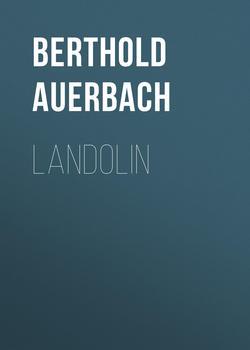Читать книгу Landolin - Auerbach Berthold - Страница 7
CHAPTER VII
ОглавлениеUpon entering the fair ground, Landolin was immediately greeted by the farmer Titus, called the Mountain-king, whose estate lay on the other side of the plateau. Titus offered him a large sum for the prize cow, which Landolin haughtily refused. He was soon surrounded by a crowd of farmers, who, partly in earnest, and partly in jest, charged him with having ruined the fair by exhibiting her, for the other cattle looked small and poor in comparison. Landolin smiled; he had brought her merely to gratify his pride, but he was very well pleased to find that he had been able to arouse the envy of others; and the annoyance of the Mountain-king especially pleased him, as they had long been rivals. The other farmers had really no ambition, their thoughts and efforts were centered on gain. This was the case with the rivals, too, but in addition to this, they desired a special recognition of their superior importance.
The Mountain-king Titus had this advantage, he despised the world, and let it be so understood; the man who does this the world runs after. He acted as if (and perhaps it was true) he desired nothing from any one; he had the indifference of the pretentious peasant; he might hear his name spoken behind him seven times without so much as turning his head to find out who spoke, or what was said of him. He rarely talked with any one, but when he did, the person addressed was happy; "The Mountain-king has just spoken to me, and so long, and so politely!" – he who could say this was elated with the honor. Landolin, on the other hand, despised the world no less than the Mountain-king; but he longed for applause and homage, and when it was not voluntarily offered him, he endeavored to compel it. He was boastful, and displayed his condescension, or even his anxiety for the good opinion of this and that one, and by that very means trifled away the desired standing.
Landolin and the Mountain-king treated each other like friends, while at the same time they hated each other profoundly.
Presently they stood in the presence of a third person, to whom each of them was bound to do honor. Pfann, the Circuit Judge, a man with a fine countenance, wearing gold spectacles, was walking with his wife on his arm, through the crowded fair, bowing here and there. He now came up to the two men, and told them that on the next day they would be summoned to serve on the jury.
"I'm sorry it cannot be arranged otherwise," he added, "but the next term of court falls during harvest."
"It's always so," cried Landolin; "in return for paying high taxes, we have the privilege of sitting for weeks at a time, nailed to a bench."
He thought that he had spoken not only with dignity, but with general approval, and he looked around for signs of assent; but nobody nodded.
Titus, on the other hand, was silent, and his silence was more weighty than Landolin's words.
"We may congratulate you," said the judge's wife to Landolin; "I hear your daughter is to be betrothed to the miller's son, Anton, of Rothenkirchen. He is an excellent young man, intelligent, well-educated, and brave."
Landolin did not appear to be altogether satisfied with this praise, and could not help saying, vaingloriously, even at the expense of his future son-in-law:
"Yes, the young folks are so desperately fond of each other, that I have given my consent. Thank God, I am able to take a son-in-law of lower rank; and, indeed, he might have been an officer. But I must say farewell; I have waited too long, they are expecting me at the 'Sword.'" He stepped quickly away.
When the Circuit Judge had found his way through the crowd to a quiet corner, he said:
"There you have a sample of your honest-hearted peasantry. Utter stupidity or cunning roughness is their alternative. The roughness hits at random, without reflecting how the smitten feels the blow. Landolin is not ashamed to belittle the brave boy his daughter is to marry, merely to make himself appear bigger by his side."
"I still hold," answered his wife, "that the hearts of these people are true, and are often better than their words and deeds. Landolin did not really wish to speak disparagingly of Anton; he only wanted to set down his old rival, Titus; for Titus, too, would have been glad to have Anton for a son-in-law."
The judge was astonished at this new information from his wife; but at her charitable judgment, which nothing could shake, he had long since left off being astonished.
They wandered on; and as they proceeded, the greetings given the wife were, if possible, more earnest than those given the judge himself. She nodded to some with special friendliness, and to a few she gave a pleasant passing word.
